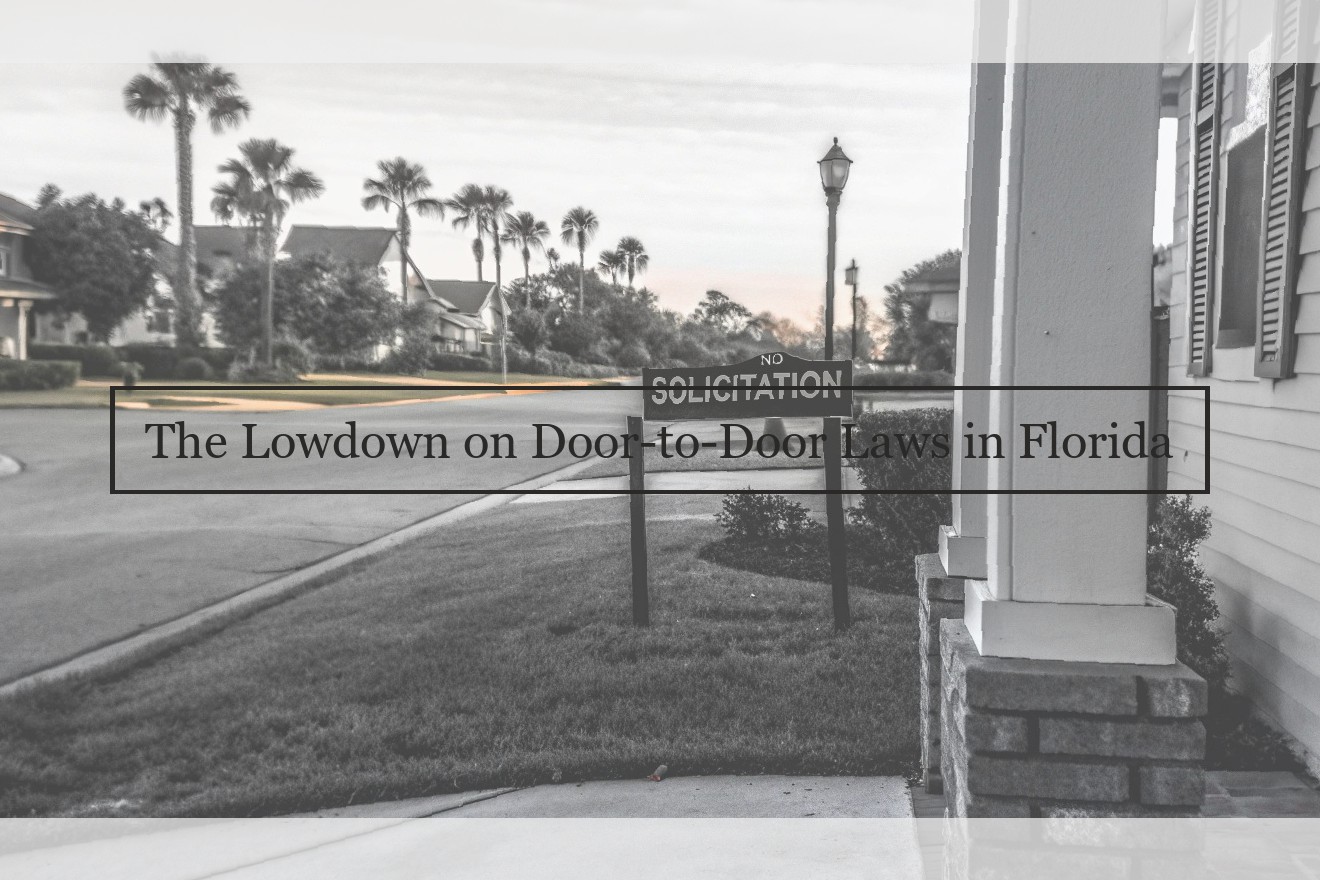Everything You Need to Know About Florida’s Solicitation Laws
Florida, like many other jurisdictions in the country, has laws that regulate door-to-door solicitations and canvassing. For the purposes of this chapter we will refer to them as solicitation laws (or ordinances). The solicitation laws in Florida are intended to protect residents from unwanted sales tactics that come with door-to-door solicitations. Moreover, they are intended to minimize public nuisance issues that can be caused by door-to-door canvassing. Beyond those general statements, the various solicitation laws in Florida range from ordinances that make door-to-door canvassing a permit only activity, to ordinances that absolutely prohibit any kind of door-to-door activity.
As briefly alluded to above, Florida has a ministerial permitting process for door-to-door marketers, some other Florida municipalities have more stringent laws related to door-to-door activities. Some of these laws may be very similar to those discussed above and applied where minor differences may exist based on the specific language of the ordinance. That being said, the high level substance of the ordinance will be the same .
To be blunt, the primary reason for the differences in these laws is that municipalities near the Miami-Fort Lauderdale metro area tend to be more aggressive about curtailing what they perceive as overly intrusive door-to-door activities in their communities. This is not to say that those municipalities are wrong in doing so, just that they are perceived to be more proactive in this area. Accordingly, it is important to keep in mind what the laws of your target community are, and to understand that the laws of one community may be drastically different from another.
It is also important to understand that from an overall management perspective, door-to-door is an area where risk management is essential. With effective risk management, the negative impacts of a permit denial, or worse yet, the imposition of a significant fine can be avoided. With poorly managed risk, a negative financial impact could be the result. A well crafted risk management plan can mean the difference between the success and failure of a door-to-door marketing campaign.
General Requirements for Solicitors in the State of Florida
Several key requirements exist in Florida that need to be fulfilled prior to engaging in door-to-door solicitation. A permit or license may be necessary before soliciting in many communities. Further, a solicitor must also identify himself/herself prior to engaging in any face-to-face solicitation. A local governmental agency or unit of local government may require additional identification prior to allowing solicitation. In Florida, solicitors should also be familiar with and comply with the Solicitation of Funds for Charitable Purposes Act (Chapter 496, Florida Statutes). This statute, in part, requires that certain solicitors register with the Florida Department of Agriculture and Consumer Services prior to soliciting funds on behalf of a charitable organization.
Rules and Restrictions
In addition to registration requirements, Florida also enforces time restrictions on door-to-door solicitation. According to municipal ordinances, solicitors and canvassers cannot go door-to-door before 9:00 a.m. and after 6:00 p.m. Florida state law prohibits any canvassing and soliciting during "quiet hours," which are extended from 9:00 p.m. to 8:00 a.m. The law also provides that no soliciting or canvassing of any type is permitted on "protected property," which may include, but is not limited to, the following: Exceptions apply to the above-referenced regulations. A real estate agent operating in Florida, for example, is permitted to canvass and solicit on property that is for sale, with prior written permission from the seller. Also, non-profit organizations and volunteers may be exempt from having to register in Florida and other jurisdictions.
Penalties for Violators
Failure to comply with Florida’s door-to-door solicitation laws can result in steep fines and penalties.
Florida law has given local governments the authority to make their own rules on conducting door-to-door solicitations. Many municipalities have adopted ordinances that make it illegal for itinerant merchants, door-to-door salespersons and door-to-door canvassers to make any sales pitches or take orders for any goods or services in person unless they have first obtained a permit. Similar restrictions and enforcement standards are found in many homeowners’ associations (HOAs) regarding uninvited solicitors. In many municipalities and HOAs, the violations are criminal in nature. The failure to comply with solicitation provisions in these jurisdictions can expose violators to substantial criminal penalties, including fines of $500 to $1,000 per offense.
Florida also has a specific law concerning misrepresentations made by door-to-door solicitors. Misrepresentation is a third-degree felony under Florida law. Last year, a Florida lawmaker proposed a bill to increase the penalty for misrepresentation from a third-degree to a second-degree felony in certain conditions. However, the bill did not pass and therefore the penalties remain a third-degree felony.
For municipalities that lack door-to-door solicitation ordinances making violations a criminal offense, the violation will most oftentimes be addressed with an "order to cease and desist." The intent of these orders is to force solicitors to stop their uninvited actions in these sensitivity residential neighborhoods. Pursuant to Florida Statutes Section 162.12, if the violator refuses to cease and desist after being warned, then the municipality can impose fines up to $1,000 per day. Moreover, upon the third repeat violation, the unauthorized soliciting party can be charged with a second degree misdemeanor. Fines for misdemeanors can be as much as $500 and possible incarceration time of 60 days.
Violations of homeowners’ association governing documents will be enforced through civil actions. Pursuant to Florida Statute Section 720.305, a homeowner convicted of violating an HOA rule can be fined up to $100 per day for each violation, with a $1,000 cap. If the fine is not paid within 5 days of assessment, the association can bring a civil action and collect the delinquency to the same extent as assessments under Florida Statute Section 720.303(1). Additionally, the homeowner is liable for all reasonable attorneys’ fees and costs incurred by the association in enforcing its declaration of covenants or rules.
Rights and Obligations for Residents
Florida residents have the right to enjoy peace and quiet in their homes without persistent knocking or doorbell ringing. Residents can set the parameters for door-to-door solicitation on their property. Those who choose to limit visitation must do so within the law. For instance , homeowners cannot accost or use physical force on door-to-door salespeople. Homeowners may elect to only allow solicitors in their neighborhood who have an official permit. This does not require the homeowner to accept the solicitor’s proposition. Homeowner’s may also declare an area such as a front porch or patio as private. Then all solicitors who approach the area without permission may be cited for trespassing. Solicitors who approach a private area without gaining prior permission can be reported to local law enforcement. Solicitors must abide by several rules under the Florida door-to-door solicitation laws. Solicitors must identify themselves in a way that makes it apparent they are offering services for hire. This means wearing a name badge or uniform identifying their company. Solicitors should not become aggressive if a door is slammed in their face. They are required to abandon their visit if asked to leave the premises by the homeowner. They cannot make another attempt to gain access into the home. Solicitors must abide the Do Not Knock registry. Homeowners who would like to be placed on the list must notify the local sheriff’s office. Solicitors are prohibited from visiting homes on the list. The law prohibits solicitation on Sundays and holidays. Solicitors cannot approach a homeowner more than seven days after delivering a written notice that is identical to the No Solicitation sign.
What Businesses Can Do
In order to avoid violating Florida law, businesses must diligently train employees on the requirements for door-to-door solicitation. Certainly, there are forms, registrations, licenses, and other documentation which a business needs in order to operate legally. However, none of that would matter if the business does not have staff that understands the solicitation laws and complies with those laws. Furthermore, after training, the staff must actually follow the procedures they have learned.
Beyond the typical compliance paperwork, one best practice is to keep the door-to-door sales documentation in a binder that will itself act as a notice to any employees that enter the office. Another best practice is to hang a "Do Not Solicit" sign on an establishment door. This sign should be posted inside of any office building door as well as on an outside door. Out of an abundance of caution, any employee that makes door-to-door sales should also carry a copy of the ordinance with them at all times while making sales.
Final Thoughts: Keep Current and Informed
Staying up-to-date with local ordinances and state laws addressing door-to-door solicitation is crucial for all. Not only can this knowledge protect you as a resident, but it can protect your business from vendors who may fall out of compliance with state and local sales laws. As a resident , knowing what constitutes legal solicitation will reduce the number of intrusions into your home and fill you with confidence that the solicitors you are experiencing are in compliance with established guidelines. As a business owner, keeping current records of sales ordinances will help to avoid situations where your business can be unfairly advertised or put at risk for violating regulations when it comes to building access and the rules regarding sale laws.




+ There are no comments
Add yours